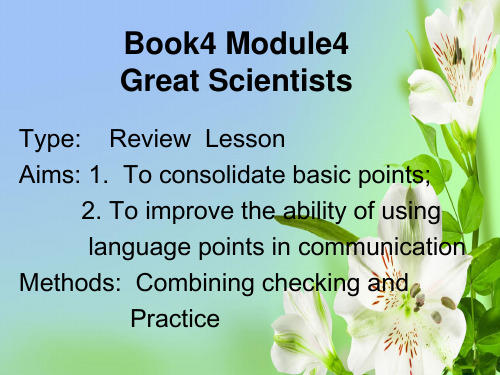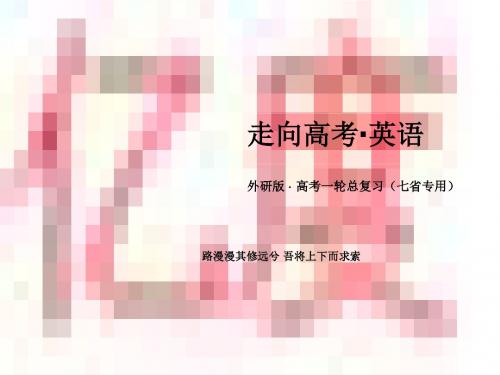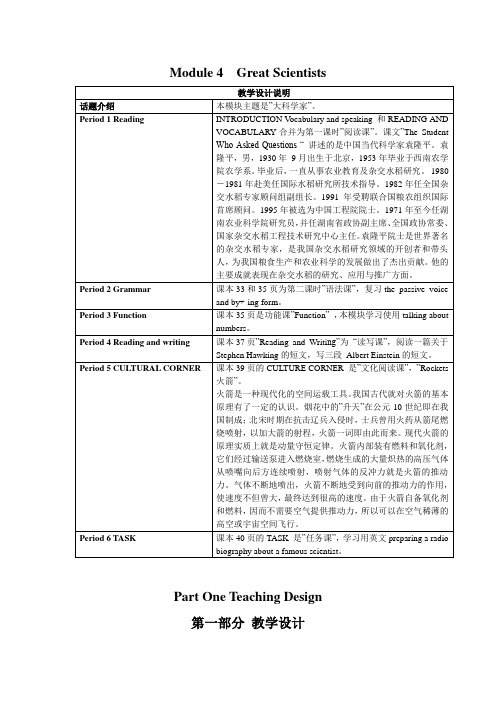外研社必修四 module 4 great scientists cultural corner and language points课件(共18页)
- 格式:pptx
- 大小:2.11 MB
- 文档页数:19

传奇人物----霍金斯蒂芬·威廉·霍金,1942年1月8日出生,曾先后毕业于牛津大学和剑桥大学三一学院,并获剑桥大学哲学博士学位。
在大学学习后期,开始患“肌肉萎缩性脊髓侧索硬化症”(运动神经元疾病),半身不遂。
他克服身患残疾的种种困难,于1965年进入剑桥大学冈维尔和凯厄斯学院任研究员。
这个时期,他在研究宇宙起源问题上,创立了宇宙之始是“无限密度的一点”的著名理论。
1969年起任冈维尔和凯厄斯学院科学杰出成就研究员。
1972-1975年先后在剑桥大学天文研究所、应用数学和理论物理学部进行研究工作,1975-1977年任重力物理学高级讲师,1977-1979年任教授,1979年起任卢卡斯讲座数学教授。
其间,1974年当选为皇家学会最年轻的会员。
1974-1975年为美国加利福尼亚理工学院费尔柴尔德讲座功勋学者。
1978年获世界理论物理研究的最高奖爱因斯坦奖。
霍金的成名始于对黑洞的研究成果。
在爱因斯坦之后融合了20世纪另一个伟大理论──量子理论,他认为,宇宙是有限的,但无法找到边际,这如同地球表面有限但无法找到边际一样;时间也是有开始的,大约始于150亿到200亿年前。
1988年获沃尔夫物理学奖。
1985年霍金丧失语言能力,表达思想唯一的工具是一台电脑声音合成器。
他用仅能活动的几个手指操纵一个特制的鼠标器在电脑屏幕上选择字母、单词来造句,然后通过电脑播放声音,通常制造一个句子要5、6分钟,为了合成一个小时的录音演讲要准备10天。
1988年写成科普著作《时间简史》,至1995年10月该书发行量已超过2500万册,译成几十种语言,中译本也已出版。
著有《空间-时间的大比例结构》(1973年与人合著)、《广义相对论:爱因斯坦百年评论》(1979年与人合编)、《超空间和超重力》(1981年与人合编)、《宇宙之始》(1983年与人合编)、《时间简史》(1988年)。
1990年与结婚25年之久的妻子简·怀尔德离婚。


Module 4 Great ScientistsTeaching Time: 教学时间Teaching Aims: 教学目标1. Knowledge and Skills 知识与技能a. Make students know some words, phrase and related expressions about scientists.b. Make students make a revision about the passive voice and the usage of “ by +- ing”.c. Make students learn to write an essay on great scientists’ life.d. Make students proficiently master how to say the numbers.e. Improve students’ abilities of listening, speaking, reading and writing.2. Process and Methods 过程与方法a. Improve students’ speaking ability through group discussion.b. Improve students’analyzing and resolving abilities through groupcooperation.3. Emotion and Values 情感与价值Make students know something about the current development of science and technology, as well as make them learn from those great scientists, such as the spirit of devoting to science, seeking truth and persistent dedication for human’s happiness and development.Teaching importance and difficulties:教学重点与难点1. Teaching Importance 教学重点a. Master some science-related vocabularies.b. Learn how to use passive voice.c. Learn how to say numbers.2. Teaching Difficulties 教学难点a. Make students understand some common expressions used in quiz show while listening.b. Enable students to use passive voice correctly.c. Enable students to write essays on great scientists’life according to thestructure of the passage.Teaching Plan:教学计划Period One:Introduction, Reading and V ocabulary, FunctionPeriod Two: Grammar 1 and Grammar 2Period Three: Listening and V ocabulary, Pronunciation, Everyday EnglishPeriod Four: Reading and WritingPeriod Five: Cultural Corner, Module FileReadingTeaching Goals:1.To know something about great scientists, such as Qian Xuesen, Marie Curie,Archimedes, Albert Einstein and Yuan Longping;2.To learn some science-related words;3.To learn how to say numbers.Teaching Procedures:Step 1: Lead in----- IntroductionBrainstorm:Question: What great scientists do you know? ( free speaking )Make students say something about those four great scientists--- Qian Xuesen,The answers:1. zoology2. botany3. biology4. physics5. biochemistry6. chemistry7. geneticsStep 2:Reading and Vocabulary1.From the title “The Student Who Asked Questions”, guess what the passage isabout?Who is the student?2. Make students find the topic sentence of each paragraph.Para1: Yuan Longping is a leading figure in the rice-growing world.Para2: As a boy, he was called “the student who asked questions”.Para3: As a young teacher, he began experiments in crop breeding.Para4: He discovered a special type of rice plant.Para5:His discoveries increased Chinese rice production.Para6:The yield of the new hybrid rice is much greater than that of other types grown in Pakistan.3. Make students skim the passage and find the answers to the following questions.1)What kind of student was Yuan Longping when he was young?2)What way did he think to produce rice more quickly?3)What did he discover?4)How important was the discovery?The possible answers:1)He was a student with lots of questions and he was interested in plants.2)By crossing different species of rice plant, then he could produce a new plant which could give a higher yield than either of the original plants.3)He discovered a naturally sterile male rice plant.4)Chinese rice production rose by 47.5% in the 1990’s.There were other advantages.●50,000 square kilometers of rice fields were converted to growing vegetablesand other cash crops.●Yuan’s rice was exported to other countries.●His rice’s yield is much greater than the yield of other types of rice grown inPakistan.4.Make students read the passage carefully and decide whether the statement are true or false.1). China produces more rice than any other country.2). Yuan Longping asked a lot of questions at school.3). He developed a new kind of fast-growing rice.4). The government helped him in his research.5). The new rice replaced vegetables in 50 thousand square kilometers.6). The new rice is now grown n other countries, such as Pakistan.The answers: TTTTFT5. Make students finish exercises in activity 3 and 4 on page 33 individually,then check the answers.Step 3: Language points1.He thought that (the key to feeding people was to have more rice and toproduce it more quickly.) 宾语从句2.He though there was only one way to do this---by crossing different speciesof rice plant, and then he could produce a new plant which could give a higher yield than either of the original plants.3.First Yuan Longping experimented with different types of rice.experiment: (V.)做实验4. This was the breakthrough.5. 50 kilometres of rice fields were converted to growing vegetables and othercash crops.6. Following this, Yuan Longping’s rice was exported to other countries, such as ….Step 4: Function1. Make a revision about how to say numbers in English.Integral number整数fractional number 分数decimal number 小数percentage 百分数3.Make students finish exercises in activity 1 and 2 on page 35.Step5: Homework1.Make students preview grammar 1 and 22.Finish exercise 5 to 12 on page 86 . (vocabulary and reading。


Module 4 Great ScientistsPart One Teaching Design 第一部分教学设计Period 1 Reading—The Student Who Asked Questions ■Goals●To learn to read passages with the passive voice and by+-ingabout great scientists●To learn to read with strategies■ProceduresStep 1: Warming up by defining sciencesBiochemistry: A branch of chemistry studying the chemicalbehavior in living beings. Biochemistry is not only interested in theindividual chemical components but also their vital interplay.Biology: the science that deals with living things. It is broadly divided into zoology, the study of animal life, and botany, the study of plant life. Subdivisions of each of these sciences include cytology (the study of cells), histology (the study of tissues), anatomy or morphology, physiology, and embryology (the study of the embryonic development of an individual animal or plant). Also included in biological studies are the sciences of genetics, evolution, paleontology, and taxonomy or systematic, the study of classification.Botany: the scientific study of plant life. As a branch of biology, it is also sometimes referred to as plant science(s) or plant biology. Botany covers a wide range of scientific disciplines that study the growth, reproduction, metabolism, development, diseases, and evolution of plants. Genetics: scientific study of the mechanism of heredity. While Gregor Mendel first presented his findings on the statistical laws governing the transmission of certain traits from generation to generation in 1856, it was not until the discovery and detailed study of the chromosome and the gene in the 20th cent that scientists found the physical basis of hereditary characteristics. Zoology: The original branches of zoology established in the late 19th century such as zoo-physics, bionomics have largely been subsumed into more broad areas of biology which include studies of mechanisms common to both plants and animals.Chemistry: the science of matter and its interactions with energy and itself (see physics, biology). Because of the diversity of matter, which is mostly in the form of atoms, chemists often study how atoms interact to form molecules and how molecules(分子) interact with each other.Physics: the science of Nature in the broadest sense. Physicists study the behavior and properties of matter in a wide variety of contexts, ranging from the sub-nuclear particles from which all ordinary matter is made (particle physics) to the behavior of the material Universe as a whole (cosmology宇宙论).Step 2: Before you readPlease go over the word list for this module, paying attention to the pronunciation of the word, the relationship between its pronunciation and its spelling.Step 3: While you read1. Type of writing and summaries of The Student Who Asked QuestionsType of writing A narrationIdea of 1st para. In the rice-growing world, the Chinese scientist, Yuan Longping, is a leading figure.3. Complete the article with one word in each blankThe Chinese scientist, Yuan Longping, is a _1_ figure in the rice-growing world. When he was educated in school he was given the _2_ , “the student who asks questions”. From an early age he was so interested in plants that he _3_agriculture in college. As a young teacher he began experimenting in crop breeding. First Yuan Longping _4_ with different types of rice. The results became known in China in 1966. Then he _5_ his search for a special type of rice plant. It had to be male. It had to be sterile. Finally, in 1970 a _6_sterile male rice plant was discovered. This was the breakthrough. As a _7 _of Yuan Longping’s discoveries Chinese rice production rose by 47.5 per cent in the 1990’s. There were other _8_, too. 50 thousand square kilometers of rice fields were converted to growing _9_and other cash crops. Following this, Yuan Longping’s rice was exported 1. What does “staple” mean in “In a hungry world rice is a staple food and China is the world’s largest producer”?A. chief or prominent among the products exported or produced by a country or district; chiefly orlargely dealt in or consumed.B. basic, chief, or principal: staple industries.C. principally used: staple subjects of conversation.D. important and outstanding2. He studied agriculture in college and as a young teacher he began experiments in _____.A. crop breedingB. feeding peopleC. sterile male riceD. with different types of rice3. He thought that the key to have more rice was by _____.A. experimenting with different types of riceB. asking questionsC. crossing different species of rice plantD. searching for a special type of rice plant4. Finally, in 1970 a _____ was discovered. This was the breakthrough.A. staple foodB. new plant which could give a higher yieldStep 4: After you read2. Speaking about Yuan Longping3. Read the text to transfer informationYou are going to read the text again and draw a diagram of it. You may use the diagram to retellPeriod 2 Grammar—Revision of the passive voice andby+-ing form■Goals●To rev iew the passive voice and by+-ing form■ProceduresStep 4: Absorb information concerning National College Entrance Examination1. In some parts of the world, tea ___ with milk and sugar. (1993NMET)A. is servingB. is servedC. servesD. served解析B 因为serve是及物动词,其动作承受者tea做主语,表示经常发生的情况,故用一般现在时的被动语态。

Module 4 Great Scientists伟大的科学家核心词汇1.She closed her eyes against the____________ (明亮的>light.b5E2RGbCAP2.As far as I know,all these people are innocent ____________ (牺牲者>.p1EanqFDPw3.The recent hot,humid weather is affecting air ____________ (质量>.DXDiTa9E3d4. The Indians were the____________(原来的>inhabitants of North America.RTCrpUDGiT5.We love reading your letters and we try to ____________ (发表>as many as possible.5PCzVD7HxA6.Rice is the____________(主要的>diet in many Asian countries.jLBHrnAILg7.The directors were trying to get rid of her,but her staff all____________(支持>her.xHAQX74J0X8.They have made a major____________(突破>in cancer research.LDAYtRyKfE9.He was ____________at a public university.The____________there taught so well that he received a good____________.(educate>Zzz6ZB2Ltk10.“In ____________,your work is bad,”said the boss ____________ .(brief>dvzfvkwMI11.brilliant2.victims3.quality4.original5.publish,6.staple7.supported8.breakthroughcated;educators;education 10.brief;brieflyrqyn14ZNXI高频短语1.________________ 培养;养育2.________________ 带进;引进;挣得3.________________ 由于……的结果4.________________ 因/以……而闻名/出名5.________________ 从……来;源于6.________________ 谋生7.________________ 掌权;执政8.________________ 对……进行实验9.________________ 偶然,意外地10.________________ 被系/捆在……上11.________________ 从……毕业12.________________ 被诊断为13.________________ 沿笔直的方向14.________________ 目前,现在1.bring up2.bring in3.as a result of4.be known for,e from6.make/earn/get a (one’s> livingeto/into power8.experiment with9.by accident 10.be attached to 11.graduate from 12.be diagnosed with 13.in a straight direction 14.at presentEmxvxOtOco重点句式1.In the________________,the Chinese scientist,Yuan Longping,is a________________.SixE2yXPq5在水稻种植领域,中国科学家袁隆平是一位杰出人士。
外研版高中英语必修四Module 4 Great Scientists 重难点知识点总结【重点单词】1.biochemistry ['baɪəu'kemɪstri] n. 生物化学2.biology [baɪ'ɒlədʒi] n. 生物学3.botany ['bɒtəni] n. 植物学4.genetics [dʒə'netɪks] n. 遗传学5.zoology [zu'ɒlədʒi] n. 动物学6.staple ['steɪpl] adj. 主要的,重要的7.producer [prə'dju:sə] n. 生产者8.leading ['li:dɪŋ] adj. 主要的9.figure ['fɪɡə] n. 人物cate ['edjʊˌkeɪt] vt. 教育11.nickname ['nɪkˌneɪm] n. 绰号12.agriculture ['æɡrɪˌkʌltʃə] n. 农业13.breeding ['bri:dɪŋ] n. 培育14.species ['spi:ʃi:z] n.(动物或植物的)种15.yield [ji:ld] n. 产量16.original [ə'rɪdʒɪnəl] adj. 原来的;最初的17.publish ['pʌblɪʃ] vt. 出版18.sterile ['steraɪl] adj.(指生物)不孕育的;不结果实的19.breakthrough ['breɪkθru:] n. 突破20.support [sə'pɔ:t] vt. 支持21.production [prə'dʌkʃn] n. 产量22.convert [kən'vɜ:t] vt. 改变;转换23.export [ɪk'spɔ:t] vt. 出口24.hybrid ['haɪbrɪd] n. 杂交种25.agricultural [ˌæɡrɪ'kʌltʃərəl] adj. 农业的26.replace [rɪ'pleɪs] vt. 取代;以……代替27.quantity ['kwɒntəti] n. 数量28.quality ['kwɒləti] n. 质量29.best-seller [ˌbest'selə] n. 畅销书(或唱片等)30.cosmology [kɒz'mɒlədʒi] n. 宇宙生成学;宇宙论31.diagnose ['daɪəɡˌnəʊz] vt. 诊断32.victim ['vɪktɪm] n. 受害者33.brilliant ['brɪljənt] adj. 聪颖的;才华横溢的34.career [kə'rɪə] n. 生涯;经历35.brief [bri:f] adj. 简短的;简洁的36.partly ['pɑ:tli] adv. 部分地;在一定程度上37.physical ['fɪzɪkl] adj. 身体的38.graduate ['ɡrædʒuˌeɪt] vi. 毕业39.personal ['pɜ:sənl] adj. 个人的40.relativity [ˌrelə'tɪvəti] n. 相对论41.rocket ['rɒkɪt] n. 火箭lennium [mɪ'leniəm] n. 千年43.gunpowder [ɡʌnˌpaʊdə] n. 火药44.explosion [ɪk'spləʊʒn] n. 爆炸;爆炸声45.explode [ɪk'spləʊd] vi. 爆炸46.escape [ɪ'skeɪp] vi. 逃跑;逃避47.arrow ['ærəʊ] n.(弓)箭48.straight [streɪt] adj. 直的49.clear [klɪə] vi.(烟雾)消散【重点短语】1.experiment with sth. 用某物实验2.experiment on sth. 对某物进行实验3.carry out/perform/conduct an experiment 做实验4.make a breakthrough 取得重大突破(进展)5.convert A into/to B 把A转换成B6.take the place of 取代,代替7.instead of 代替,而不是8.bring up 抚育;教养;呕吐;提出(话题等)9.bring down 降低10.bring about 导致,引起11.bring back 归还;恢复;回想12.bring in 赚(钱);带进;传入13.search for 寻找14.search sb./someplace 搜查某人或某地15.in search of 寻求/寻找……16.as a result of 由于……的结果17.as a result 因此,结果18.owing to/thanks to 由于19.the key to… ……的关键20.export sth. to 出口某物到……21.the second most important 第二重要的22.be interested in… 对……感兴趣23.graduate from… 从……(地方)毕业24.escape from /out of someplace 从某地逃脱/逃走25.escape from reality 逃避现实26.have a narrow escape 九死一生27.a fire escape 紧急出口;安全门28.clear up (天气)放晴;整理;收拾29.be known for 因……而出名/闻名30.earn one’s living 谋生e to power 掌权;执政32.take power 取得政权33.It is possible that…. 可能……34.It’s certain that... 肯定……35.It’s likely that… 可能……36.It seems that... 好像……37.at war 在交战中38.be diagnosed with 被诊断出;患有39.become the voice of... 成为……的代言人40.partly because of 部分原因是【重点句型】1.She needs a high income to support such a large family.她需要一份高收入来养活这么一大家子。
Module 4 Great Scientist教学设计教材版本:外研版(Book 4)模块:Book 4 Module 4教学设计时段:本单元第2课时 Reading and Vocabulary教学课型:阅读理解课教材分析:本模块以 Great Scientist为话题,通过教学使学生了解古今中外不同领域的科学家的生平经历及他们的卓越贡献,阅读袁隆平和Stephen Hawking 的事迹,使学生树立正确的人生观、价值观。
并根据学生的已有知识,指导学生发表对伟大科学家的了解和看法。
本课阅读内容描写了“杂交水稻之父”袁隆平的生平和事迹,并阐述了他从事这项工作的重要性和所取得的成就。
激励他们树立远大理想,奋发图强。
学情分析:本模块是第4册第4单元,学生已经学了4册书,学生可以用英语进行对本单元的话题进行讨论和发表自己的观点。
教学目标:一、语言目标1、词汇和短语Staple, producer, leading, figure, educate, agriculture, breeding, species, original, publish, sterile, breakthrough, support, production, convert, export, hybrid, quality, quantity, bring up, as a result of, cash crop2、重点句子(1)In the rice-growing world, the Chinese scientist, Yuan Longping, is a leading figure.(2)He thought there was only one way to this ---by crossing different species of rice plant, and then he could produce a new plant which could give a higher yield than either of the original plants.(3)As a result of Yuan Longping’s discoveries Chinese rice production rose by 47.5 perc ent in the 1990’s二、能力目标1、Enable students to talk about “the father of hybrid rice—Yuan Longping”2、Understand the text answer the related questions.3、Enable the students to understand the details about the passage, choosingthe correct answer according to the text and fill in the form about the passage.三、学能目标Help students learn how to talk about Yuan Longping and his achievements. 教学重点:1 Talk about “the father of hybrid rice---Yuan Longping”When and where was he born?Why was he famous?What did he discover?How important is the discovery?2 Discuss the question of comprehension:Why is Yuan Longping’s discovery very important?教学难点:1 Understand the importance of scientists’ achievements.2 Discuss the questions:What would you think of the new hybrid rice if you are a rice farmer? Explain why.Is the title of the passage suitable? If not, write a new one and give the reasons.3 Discuss what the students can learn from Yuan Longping.教学方法:1 Skimming and scanning2 Asking- and- answering activity in understanding the text.3 Discussion.Teaching procedures(教学过程):Step One Warming upShow the students some pictures of great scientists and ask them to talk about who they are and what achievements they had. Then show some pictures of Yuan Longping. Ask the students if they know something about him.(首先在屏幕上呈现一些著名科学家的图片,让学生讨论是否他们了解这些科学家,其目的是导入我国著名的科学家袁隆平这一话题)Step Two Reading1 ScanningGet the students to comprehend the passage quickly. Tell the students to look through the whole passage to get the general ideas of the passage. Encourage the students to express their different opinions in English. Then ask the students to look at the title of the passage. Ask the students if the title of the passage is suitable. If not, write a new one and give the reasons. Ask them to discuss with their partners.(这一环节目的是让学生快速阅读课文并了解文章大意,讨论文章的标题是否合适,可用什么标题来替换)2 Choose the best answer.(1)How could he manage to produce more ricequickly ?A.By crossing different species of rice plantB.By planting more riceC.By bringing in rice from other countriesD. By doing more experiments(2)The last two paragraphs mainly talk about___.A.China’s agriculture developmentB.Yuan Longping’s elderly lifeC.foreign countries’s agriculture revolutionD. Yuan Longping’s contributions to China and the world’s population (在屏幕上呈现以上的选择问题,检测学生是否了解文章大意)3 Find out the topic sentences.Para 1 Yuan Longping is a leading figure in the rice-growing world.Para 2 As a boy, he was called “the student who asked questions”.Para 3 As a young teacher, he began experiments in crop breeding.Para 4 He discovered a special type of rice.Para 5 His discoveries increased Chinese rice production.Para 6 The yield of the new hybrid rice is much greater than that of other types grown in Pakistan.(通过寻找The topic sentences的活动,让学生进一步的阅读和理解文章大意)4Read the passage again and judge the statements True of False.(1) China produces more rice than any other country.(2) Yuan Longping asked a lot of questions at school.(3) He developed a new kind of fast-growing rice.(4) The government helped him in his research.(5) The new rice replaced vegetables in 50 thousand square kilometers.(6) The new rice is now grown in other countries, such as Pakistan.(本环节目的是通过True or False questions 的练习使学生加深对课文的理解)5 Fill in the blank.Yuan Longping is a leading figure in the __________ world. As a boy, he was called “the student who asks question” . As a young teacher, he began _________ in crop ________. He thought that the ___ to feeding people was to have more rice and to produce it more quickly. In 1970 a naturally male rice plant was discovered. This was the ___________. As a result of this, Chinese rice production rose __47.5percent. The _____of the new rice is much greater than that of other types of rice grown in Pakistan.(这一项练习目的是帮助学生更好的了解袁隆平的生平与他的贡献,通过本项练习,指导学生如何进行课文的复述,这也是这一节课教学所要达到的能力目标之一。